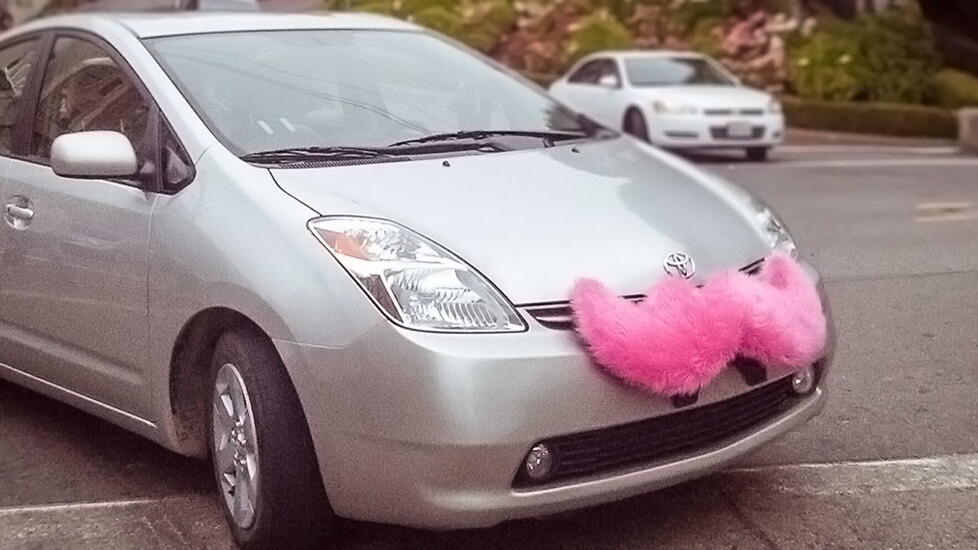
Lyft president John Zimmer just shared a bold manifesto about what he sees the impact of driverless cars will have on our society, and the way we move through our cities. Like most thinkpieces, the fourteen page paper was published on Medium, and it’s excellent.
Zimmer sincerely believes that we’re on the precipice of driverless cars being viable. He estimates that by 2021 – just five years from now – the majority of Lyft rides will be taken in a driverless car, and that by 2025 private automobile ownership will “go the way of the DVD.”
Bold words. I sure hope he’s right.
Safety First
By and large, humans are terrible drivers. The sobering reality of the 1.3 million dead each year in automobile accidents is proof of that.
We’re too impulsive. Too inconsistent. Our attention spans are too short, and our judgement is frequently faulty. This fact demonstrated to me earlier today, when the bus I was traveling in plunged into the side of an Audi A5 on a busy roundabout.
The damage. pic.twitter.com/Lg0HUQali1
— Matthew Hughes (@matthewhughes) September 18, 2016
I’m not 100 percent sure about the chain of events that lead to the crash. At the time, I was working on my laptop and not paying any attention to the road. I only looked up when I heard the roar of the bus’s horn, followed by the violent smash as both vehicles collided.
Luckily, everyone was unharmed, although both vehicles sustained some damage.
Here’s what I am 100 percent sure about: If both the Audi and the bus were driverless, the crash wouldn’t have happened. Driverless vehicles are deliberately designed to be cautious.
Rather than making decisions based on gut judgement and intuition, they use sensors that collect thousands of points of data with perfect consistency. Driverless automobiles are concerned with safety, not speed or showmanship. By virtue of this alone, computers are more qualified to be on the road than most humans I know.
Probably the most stark example of this is Google’s effort, which was the subject of a profile by the New York Times in 2015 by Matt Richtel and Connor Dougherty.
The authors described Google’s self-driving car as “a stickler for the rules.” Justifiably so. In one test, a car froze at a four-way intersection because it was programmed to wait for the other human drivers to stop completely and let it go. Predictably, the humans kept inching forward in the hope of finding an opening, which effectively paralyzed Google’s autonomous car.
Imagine being such an asshole, you break a robot.
Private car ownership is generally terrible
This is the point I’m most conflicted about. Car ownership can emancipate you. You no longer have to wait for the bus in the rain. Train timetables no longer dictate your life.
But there’s a flip-side, as illustrated by Zimmer.
“It may shock you, but Americans spend more than $2 trillion every year on car ownership — more money than we spend on food. What’s even more staggering is that for all the money we spend on them, the 250 million cars in America are only occupied 4% of the time. That’s the equivalent of 240 million of the 250 million cars being parked at all times. For the most part, your car isn’t actually a driving machine at all. It’s a parking machine.”
In Zimmer’s world, instead of this massive fleet of “parking machines“, there would be a smaller supply of cars in circulation that people could hire on an ad-hoc basis. Transportation would go from being something that you own, to a service that you use.
This will be more cost effective than owning a car. Those who only need to take occasional trips could hire vehicles as required on a cent-per-mile basis. Frequent riders could purchase an all-you-can-eat subscription.
It’s also wonderful news from an environmental perspective. Car manufacturing is incredibly ecologically destructive, and fewer cars means fewer emissions. According to environmental expert Mike Berners-Lee, producing a medium-sized car creates 17 tonnes of CO2. This is the equivalent to that produced by an average UK household over three years.
The transportation-as-a-service model also presents an opportunity to replace all the pointless gas-guzzling cars on the road with far more efficient models. Just like airlines have started to standardize on fuel-efficient planes, like the Boeing 787 and Airbus A350, the driverless car fleets of the future would be serviced by vehicles that are hyper-fuel efficient.
Zimmer also points out that ending the use of private cars gives us a golden opportunity to redesign our cities and infrastructure for the better. According to his manifesto, there are 700 million parking spaces in the US. If each space was joined together, it would create an asphalt landmass bigger than the state of Connecticut.
Wouldn’t it be wonderful if we could replace each parking spot with greenery – ripping up the bitumen and planting grass and trees in its place? Imagine if every multi-storey parking monstrosity was replaced with affordable housing.
Not Long Now
The beautiful thing about Zimmer’s vision is that it’s not just feasible – it’s happening right now. Tesla now sells a car that can automatically switch lanes. In Pittsburgh, Uber is testing out driverless cars, albeit with human supervision. Similar trials are happening in Singapore.
This will present opportunities to make our cities healthier, better places to live. It will allow us to spend less money on car ownership. We will massively reduce carbon emissions, and millions of lives that would be lost in car accidents would be saved.
Put simply, this is an opportunity we can’t afford to pass up.
Get the TNW newsletter
Get the most important tech news in your inbox each week.





